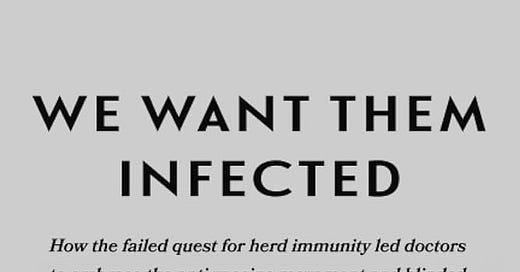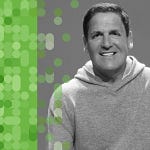Jonathan Howard is a neurologist and psychiatrist who practices at NYU-Bellevue and posts frequently on Science Based Medicine.
Transcript, unedited, with links to audio
Eric Topol (00:05):
Well, hello, Eric Topol with Ground Truths and I'm really pleased to have the chance to talk with Jonathan Howard today, who is a neurologist and psychiatrist at NYU at Bellevue and has written quite an amazing book published a few months months ago called We Want Them Infected, so welcome Jonathan.
Jonathan Howard (00:27):
Hey, thanks so much for having me. I really appreciate it.
Eric Topol (00:30):
Yeah, I mean, there's so much to talk about because we're still in the throes of the pandemic with this current wave at least by wastewater levels and no reason to think it isn't by infections at least the second largest in the pandemic course. I guess I want to start off first with you being into the neuropsychiatric world. How did you become, obviously caring for patients with Covid, but how did you decide to become a Covidologist?
Jonathan Howard (00:59):
Well, I developed a strong interest in the anti-vaccine movement of all things about a decade ago when a doctor who I trained with here at NYU in Bellevue morphed into one of the country's biggest anti-vaccine doctors a woman by the name of Dr. Kelly Brogan. I knew her well and we were friends; She was smart and after she left NYU in Bellevue, she became one of the country's most outspoken anti-vaccine doctors and really started leaving off the wall things that germ theory didn't exist, that HIV doesn't cause AIDS. When Covid struck, she felt that SARS-CoV-2 was not killing people because she doesn't believe any virus kills people and so I became very fascinated about how smart people can believe strange, incorrect things and I dedicated myself to learning everything that I could about the anti-vaccine movement. In 2018, I wrote a book chapter on the anti-vaccine movement with law professor Dorit Reiss.
(02:01):
And so when the pandemic came around, I was really prepared for all of their arguments, but I got two very important things wrong. I thought the anti-vaccine movement would shrink. I was wrong about that and I was also really caught off guard by the fact that a lot of mainstream physicians started to parrot pandemic anti-vaccine talking points. So all of the stuff that I'd heard about measles and the HPV vaccine, these are benign viruses, the vaccines weren't tested, blah, blah, blah. I started hearing from professors at Stanford, Harvard, UCSF, Johns Hopkins, all about Covid and the Covid vaccine.
Eric Topol (02:40):
Yeah, we're going to get to some of the leading institutions and individuals within them and how they were part of this, and surprisingly too, of course. Before we do that in the title of your book, We Want Them Infected, it seems to bring in particularly the Great Barrington Declaration that is just protect the vulnerable elderly and don't worry about the rest. Can you restate that declaration and whether that's a core part of what you were writing about?
Jonathan Howard (03:21):
Yeah, the title of the book is to be taken literally. It comes from a quote by Dr. Paul Alexander, who was an epidemiologist in the Trump administration and he said in July 4th, 2020, before anyone had been vaccinated, infants, kids, teens, young people, young adults, middle age with no conditions, et cetera, have zero to little risk so we want to use them to develop herd, we want them infected. This was formalized in the Great Barrington Declaration, which was written by three doctors, our epidemiologist, none of whom cared for Covid patients, Jay Bhattacharya at Stanford, Martin Kulldorf who at the time was at Harvard, and Sunetra Gupta who is at Oxford. If I could state their plan in the most generous terms, it would be the following that Covid is much more dangerous for certain people, but we can relatively easily identify older people and people with underlying conditions.
(04:19):
It's much more benign for a healthy 10-year-old, for example and their idea was that you could separate these two groups, the vulnerable and the not vulnerable. If the not vulnerable people were allowed to catch the virus develop natural immunity that would create herd immunity. They said that this would occur in three to six months and in that time, once herd immunity had been achieved, the vulnerable people who have been in theory sheltering at home are in otherwise safe places could reenter society. So it was really the best of both worlds because lives would be saved and schools would be open, the economy would be open. It sounded very good on paper, kind of like my idea of stopping crime by locking up all the bad guys. What could go wrong? It was a very short document. It took about maybe an hour to write.
(05:17):
I imagine there were some nefarious forces behind it. One of the main instigators of it was a man by the name of Jeffrey Tucker, who sounds like a cartoon villain and he worked at the, I forget, is the American Enterprise Research Institute. It was some right-wing think tank and he is a literally pro child labor. He wrote an article in 2016 called Let the Kids Work, which suggested that children drop out of school to work at Walmart and Chick-fil-A I'm not making that up and he's overtly pro child smoking. He feels that children, teenagers should smoke because it's cool and then they can quit in their twenties before there are any bad harms from it. Needless to say, the Great Barrington's premises that one infection led to permanent immunity didn't really work out so well, but they were very influential. They had already met with President Trump in August of 2020 and the day after their Great Barrington Declaration was signed, they were invited to the White House. This was October 5th, 2020 to meet with Secretary Human Health and Secretary Services, Alex Azar, and they are advisors to Ron DeSantis. They became mini celebrities over the course of the pandemic and it was a very pro infectious movement. As I said, the title of the book, We Want Them Infected, and they did.
Eric Topol (06:42):
Right. In fact, I debated Martin Kulldorf, one of the three principals of the Great Barrington Declaration. It was interesting because if you go back to that debate we brought out, at least I tried to highlight the many flaws in this. You've mentioned at least one major flaw, which was to this virus. There's not a long-term immunity built by infections. It's just, as we say with vaccines the immunity for neutralizing antibody production and protection from infections and severe Covid is limited duration for four to six months, and at least for the antibodies and maybe the T-cell immunity is longer, but that doesn't necessarily kick in and quickly. So that was one major flaw, but there are many others, so maybe you could just take that apart further. For example, I like your analogy to lock up all the bad guys, but compartmentalizing people is not so easy in life and I think this is a significant concern of the idea that is, while you indicated there may be some merits if things went as planned, but what else was a flaw of that argument or proposition?
Jonathan Howard (08:11):
So yeah, this could be a 10-hour conversation and I think importantly, we don't have to speak hypothetically here. A lot of defenders of the Great Barrington Declaration will say, oh, we never tried it, but they promised that herd immunity would arrive in three to six months after lockdowns ended. So we don't have to speak theoretically about what would've happened had we done it. Lockdowns ended a while ago and we don't have herd immunity. They were very clear on this. Dr. Kulldorf tweeted in December 2020 that if we use focus protection, the pandemic will be over in three to six months. So, what could have gone wrong if about 250 million unvaccinated Americans contracted Covid simultaneously in October and November of 2020? A lot of things, as we said, they dichotomized people into vulnerable and not vulnerable, but of course it exists on this. The only bad outcome they recognized was death.
(09:11):
They felt that either you died or you had the sniffle for a few days and you emerged unscathed. Separating vulnerable people from not vulnerable people is a lot easier than it sounds and I think by way of comparison, look at the mRNA vaccine trials. You can read their protocols and the protocols for these trials were 300-400 pages of dense policies and procedures. The Great Barrington Declaration, if you go to their frequently asked questions section, they made some suggestions, which sound great, like older people should have food delivered at home during times of high transmission, but setting up a national or even statewide food delivery program, that's a lot harder than it sounds. When asked about that later, Dr. Bhattacharya has said they could have used DoorDash, for example. So it was just very clear that no serious thought went into this because it was really an unactionable thing.
(10:21):
It's not as if public health officials had billions of dollars at their disposal and they weren't many dictators. They couldn't set up home food delivery programs overnight like they suggested and two months after the Great Barrington Declaration was published, vaccines became available so it became obsolete. Not that vaccines have turned out to be the perfect panacea that we had hoped for, unfortunately, but the idea that young people should continue to try to get natural low immunity in favor instead of vaccination became at that point obscene, but they still are anti-vaccine for young people and for children, which I find despicable at this point.
Eric Topol (11:07):
Right, the data is unequivocal that there's benefit across the board. In fact, just last week in JAMA two senior people at FDA, Peter Marks and Robert Califf published the graphs of how across all ages there was reduction in mortality with the vaccines. That gets us to, as you say now into the vaccine era of Covid and one of the things that the anti-vax community jumped on was when we moved from Delta to Omicron where previous Omicron, there was exceptionally good protection from infections, 95%. It was rare for people to get to have spread with the up-to-date vaccine with the third original strain booster. But with Omicron that fell apart and if infections were breakthroughs were exceedingly common, this led to tremendous fodder for the anti-vax saying the vaccines don't work beyond the false claims that they were, whether they're killing people or gene therapy or microchips or all these other crazy notions. But can you talk to that? Because if you still protect against deaths, Long Covid and hospitalizations, that seems to be pretty important. It's disappointing, and obviously we need ways to prevent infections or otherwise we don't really have an effective exit strategy for the pandemic. This was used and still is used today as a reason that vaccines are worthless if indeed, they're not even dangerous.
Jonathan Howard (12:55):
The vaccines when they were initially came out, as we all know, were 95% effective, but the vaccines were brand new and the virus was brand new. All of this was less than a year old and what's interesting is, unfortunately, I realized this after I wrote my book, but I published an article about this on Science-Based Medicine where I've been blogging throughout the pandemic. So, if anyone can go there, I wrote an article on October 1st, 2023, called over-hyping vaccines it wasn’t pro-vaccine it was pro stop worrying about Covid. So almost all of the doctors that I mentioned in this book vastly overhyped vaccines as soon as they came out saying they were 100% effective against severe disease, that they completely blocked transmission and just really overselling the vaccine saying that they're going to definitely end the pandemic and mocking anyone who disagreed. Now these doctors are saying, oh, there's a lack of trust in the medical community.
(13:57):
We need to rebuild trust without holding a mirror to their statements. Dr. Bhattacharya, for example, participated in a round table discussion with Governor Ron DeSantis at the very end of July. On August 1st, 2021, Ron DeSantis tweeted out a quote by Dr. Bhattacharya that said, we have protected the vulnerable by vaccinating the older population. We have provided them with enormous protection against severe disease and death. That's why you see, even as the cases have risen in Sweden, blah, blah, blah, we've protected the vulnerable. The number of deaths have not risen proportionally and this was right when the Delta wave was taking off within. This is the one thing that was interesting, this pandemic, because you had people make prediction and within days their predictions were falsified. That was a tragic thing to see, but that's 20,000 Floridians or some number like that died during the Delta wave in Florida. More Floridians died after Dr. Bhattacharya said the vulnerable have been protected than before that. So I think there was a lot of over-hyping in the vaccines, and I get where this came from. We as doctors, we wanted everyone to get the vaccines. We wanted to encourage everyone to get the vaccine. I probably did this myself at some times, but I do think that that was a problem, but the same doctors who are now saying that the vaccines were overhyped and were often guilty of them.
Eric Topol (15:35):
Right. Well, I mean, I think as you said, we didn't know the virus is going to evolve with this Omicron event with well over 35 new mutations in the spike protein, no less other parts of the virus and then of course, recently we saw another superimposed Omicron event with this BA.2.86 or JN.1 variant. The problem with this of the vaccine takedown, and as you well know because you've been studying this for more than Covid, is that it extended to many other parts of the pandemic, such as masks, such as there's no such thing as Long Covid or it's exceptionally rare and it bleeds through other areas. So could you comment about that? That is the anti-science. It's not just anti-vax.
Jonathan Howard (16:30):
No, you're absolutely right. I don't talk a lot about Long Covid just because I think a lot of other people do a much better job of that. I have a hard time grasping the numbers myself. You'll read one study, it's one in a thousand, you'll read another study. Oh, 50% of people have Long Covid. My attitude towards Long Covid is I don't know exactly how many people have it, but some people are severely affected by it. We have a lot to learn about it, this is a brand new virus. We are going to be learning about this the rest of our lives, especially the consequences of repeat infections. A baby born today is going to be infected, what? 10 times by the time they go away to college. Who knows what are going to be the consequences of that? What does this mean for autoimmunity?
(17:15):
So my attitude with Long Covid and the long-term consequences are we just have to be very humble about this and again, all of the doctors who I discussed were very arrogant about this. They were writing in as early as March 2020 that school closures may prevent children from developing herd immunity. They spoke about infections as being beneficial for children, but you're right as well that these doctors cast doubt on all in any measures that were used to stop the virus masks, testing, ventilation, lockdowns. One of their core objections wasn't that they didn't feel that these were ineffective necessarily. They objected to lockdowns precisely because they stopped the spread of the virus, so you can read some articles from Scott Atlas in April 2020. He wrote several articles in the Hill, that publication saying it's time to stop the panic, et cetera. If people were as if panic was a bad reaction to Covid, as morgues were overflowing with dead bodies, panic was the right action. He said that the lockdowns have stopped Covid from spreading and stopped natural immunity from developing, which prevents us from reaching herd immunity. So again, these guys and the authors of the Great Barrington Declaration objected to lockdown saying they just postponed the inevitable, which there may be some truth to that. Probably everyone here has been infected by Covid at least one time, but postponing the inevitable, that's what I go to work every day trying to do.
Eric Topol (19:04):
And you could say a lot for putting off an infection, of course, as long as possible. And of course, even trying to put it off forever, because as you know very well, as we went on in the pandemic, we learned a lot then there was treatments such as paxlovid and far better treatments that were available for severe Covid, many randomized trials to help prevent deaths for people who were of high risk. The other thing that I guess I can't emphasize enough, and you had a whole chapter in the book, which is about children, kids, they're not so intrinsically protected. They can die, they can be hospitalized and there have been many deaths among them from Covid, even those who don't have coexisting conditions. So maybe you could talk a little bit about that, the flaw in that it's only people of advanced age or immunocompromised and that young people are bulletproof. That doesn't seem to be the case in reviewing all the data throughout the pandemic.
Jonathan Howard (20:12):
I mean, just to reemphasize the point that you made, that someone who gets Covid today, especially if they're vaccinated and boosted is in much better shape than someone who gets Covid, who got Covid in March or April 2020. The same way I hope someone who gets Covid in the year 2030 is going to be in better shape than we are today. But yes, back to pediatric Covid, the risk to any individual child is very small. So my kids have it, my nieces and nephews had it. I wasn't particularly worried and they fortunately had very mild disease, but there's 73 million children in the United States, and when you multiply a rare event by 73 million children, the numbers began to add up. So far around 2,000 children have died of Covid, which is comparable to what measles used to do before. In the pre pandemic days, hundreds of thousands of children have been hospitalized, and depending on the variant, about a third have needed ICU care.
(21:15):
And five to 10% have been intubated. Some children have had strokes, some children have had amputations. So it's not as bad, it's not as bad as car deaths. It's not as bad as bullets, but we don't have vaccines for those conditions and the vaccine is not a panacea for children. Some vaccinated children have died, but it's like wearing a seatbelt. You can die in a car crash wearing a seatbelt, but your odds are greatly enhanced if you are wearing a seatbelt, but all of these doctors who in 2020 state to their name, to the idea that we could get rid of Covid by spreading Covid be the purposeful infection of children, were unwilling to recognize that the vaccine can help them. They use many different techniques to minimize the benefits of the vaccine. One was to say that it never demonstrated efficacy against hospitalizations and deaths in randomized controlled trials, which is true in as far as it goes because it is very hard to detect rare events in randomized controlled trials unless you do a study of 200 to 300,000 children as was done with the polio vaccine.
(22:36):
And they suggested that this should have been done, that we should have re-enrolled hundreds of thousands of children in these trials, which would've taken, I don't know, five, ten years. So that's number one. We now have about 30 observational studies, and they all show the same. And by the way, there were six randomized controlled trials of the vaccine in children involving about 25,000 children. So they're not small trial. As I said, there are about 30 trials from around the world showing that the vaccine observational trials, so observational studies, I should say, showing that the vaccine is not perfect, but it's very good at preventing rare but serious side effects or serious harms of Covid. As you know, there was just a large study out of Penn a couple days ago showing that the vaccine during the Delta in the Omicron wave was extremely effective at preventing children from entering the ICU.
(23:36):
They also treated rare mild vaccine side effects as a fate worse than death and I mean that very literally, the vaccine in young men can cause myocarditis, which is mild in about 90-95% of people with it. I'm unaware of a single American who has been known to have died from vaccine myocarditis. These doctors made dozens of YouTube videos and editorials and commentaries all saying what a catastrophe vaccine myocarditis was. How dare you minimize vaccine myocarditis. When they also wrote editorials saying, young people should not fear death from Covid, and they spoke about death from Covid as milder than vaccine myocarditis when talking about deaths from Covid, they would say, oh, it's less than suicide. More children drown every year. They would just all sorts of crazy double standards.
Eric Topol (24:38):
Right. One of the things that's extraordinary in the book, Jonathan, is that you have, it isn't like you're just writing text about it. You have all the quotes, you have all the tweets, you have all the articles. I don't know how you did that. I mean, were you keeping an active list of everything that was, I mean, I liken it to remember during in the Trump administration, there was a guy in CNN, I'm trying to remember his name.
Jonathan Howard (25:09):
Dale something.
Eric Topol (25:10):
Dale, yeah. And he had a fact check every day, and he kept track of everything. That was his job full time, but it seemed like you were the only one that has this record of every statement written on the topics that we're discussing. How did you do it?
Jonathan Howard (25:35):
Well, I did it through the blog at Science-Based Medicine is that I'd been collecting these statements starting in May 2021, and it just grew out of that. And so basically, the book is sort of a reorganization, everything that I've been writing on that blog and I will say that the fact that I have so many direct quotes has made it impossible for these doctors to refute me, because if I'm wrong, then they're right. If they're right, then we'll have herd immunity in three to six months once the lockdowns are lifted, reinfections are very rare. Variants are nothing to worry about and so they have to make that case. What they've tried to do is they've tried to do some revisionist history. So, for example, Dr. Jerome Adams, who was Trump's surgeon general, and turned out to be very reasonable guy, recently posted on Twitter, I'll still call it that, that Scott Atlas wanted to, and he was right, wanted to infect people to achieve herd immunity.
(26:49):
And Dr. Jay Bhattacharya and Dr. Vinay Prasad, who's a misinformation oncologist at UCSF, we're a gas. They said, oh no, he didn't want to purposely infect children. We just wanted schools open. The harms of school closures were just so great. So they cast themselves as these very benevolent, we were just looking out for the children. We never wanted them infected. I never said that, I never thought that, but all you have to do is just read their own words. The ones who have responded to me have responded just by childish insults, really just calling me names. I'm a schmuck, I'm a grifter, I'm a B-list Covid influencer. None of them have ever tried to engage with any of the content and all that would require them to do is stand up for their own words, which they won't.
Eric Topol (27:46):
Alright. Now, we touched on it early in our conversation, but what was one of the surprising things on the one hand there are anti-vaxxers, like RFK Jr. and people, as you mentioned, the person that you knew at NYU who went on, but then there were these surprise people who were at top academic medical centers in the country that went into misinformation campaigns, whether it was deliberate because it was associated with all sorts of attention, or whether it was misinterpretation of data. I don't understand, but can you speculate what's going on there and whether or not the universities involved should have been somehow engaging with these individuals?
Jonathan Howard (28:39):
Yeah, so it's tough for me to understand their motives. I do think that what made them more dangerous than someone like Kelly Brogan or RFK Jr. By the way, these two worlds, which I kind of treated as separate, they're beginning to merge with people like Joseph Ladapo, for example. So they're not as separate as they once were and Dr. Vinay Prasad has praised RFK Jr. saying he would destroy Dr. Peter Hotez, a hero of vaccines in the debate. I mean, it's crazy, crazy stuff up, but I think the guys who I write about were more dangerous in that they mixed good advice with bad advice. So they would say very sensible things like, yes, you have to protect grandma. Grandma has to get vaccinated with bad advice, that the vaccine is more dangerous than Covid for children, for example. They also are very good, eloquent speakers who can speak in scientific jargon and use the language of evidence-based medicine, someone like Kelly Brogan, for example, would say that she uses intuition and higher ways of knowing, and crystals and tarot cards, these guys don't do that.
(29:51):
If we were to discuss our general approach to medicine, it would be no different than ours, than anyone's. They would say, we try to use science, evidence, data, logic, and reason to reach the best conclusions. So I think that that made them more dangerous. Again, what do I think their motivations were? I think a lot of it is some of these guys are natural born contrarians, which means that they just have to be a little bit different, that when everyone else is saying X, they got to say Y and that served them well in the beginning, in most of their careers and we need people like that In medicine, I would say that Nobel Prize winner, Katalin Kariko, I am probably butchering her name, but the Hungarian woman who developed the mRNA vaccines maybe fits that profile and so we need people like that in medicine.
(30:39):
I also think they had a hard time admitting air when they drastically underestimated Covid at the start of the pandemic, and all of them did predicting 10,000 people would die predicting that it would be less severe than the flu. They had a hard time saying, oops, I was wrong. Some doctors did that. Famously, Dr. Paul Offit, another vaccine hero, said at the beginning of March, I believe, or early February 2020, that he thought the flu was going to be more dangerous than Covid and when he turned out to be wrong, he said, oops, I was wrong. You might as well make an ass of yourself in front of a million people. But I think these guys couldn't admit air and once they had committed themselves to a policy, the purposeful mass infection of unvaccinated youth, it was hard to backtrack from that. What are you going to say?
(31:26):
Oops, I was wrong, and young people suffered and died because of what I said. No, I'm not going to say that. I'm going to say the vaccine is more dangerous than the virus so I think it was a lot of that. In terms of what universities should do, they're at a bind because if they speak out against these people, they're experts at weaponizing their delusions of self-persecution. I've been silenced, I've been censored. We need, even though, like I said, they became mini celebrities and met with Trump and DeSantis and advised Governor Glenn Youngkin and they were all over the news. They're huge social media presences. They were everywhere, but where I was in a hospital with Covid patient. So I think that if universities speak out, they run the risk of the Streisand effect. It's called amplifying people inadvertently and allowing them to claim their precious victim status, but if they don't speak out, which they really haven't done, they run the risk of what they're saying is this person carries the aperture. Am I pronouncing that word of our university, that we feel that this person is competent to speak on our behalf which is a problem.
Eric Topol (32:38):
No, I think we've just seen that, of course, with the three institutions that the presidents were brought in about a whole different matter, and how they didn't necessarily speak out as they could have a totally different matter, of course. This is a real tough one as you've outlined as to whether leaders of university, for example, at Stanford, the faculty did stand up and say, we're not supporting Scott Atlas or this or that. This didn't really happen at other universities that we've touched on at least. So the individuals now going forward here, there's a much bigger story than just Covid, and it's the anti-science, anti-vax movement, which is very dangerous. I think most people who are reasonable reviewing the data would say vaccines are just extraordinary for preserving health, but we're seeing now this movement has gotten legs, it's gotten funding, it's organized, and you're well familiar with Peter Hotez's book who gets through some of that substantiates where this has been with autism and where it's going.
(33:59):
So one of the problems is that there hasn't been much in the way of any antidote, any aggressive response to basically you have the corrections, the real time, the hall of shame, if you will, of this misinformation to have fact checkers, to get the story straight and perhaps not governmental sponsored because that's also an area of uncertainty of trust in public health, but some type of agency that could take on a corrective effort for the public to know what's fact and what's not. What are your thoughts of how we can get out of this mess?
Jonathan Howard (34:46):
Oh, I think it's going to get worse before it gets better. I think skepticism about the Covid vaccines, we're already seeing this as going to bleed into other vaccines. States are doing everything they can to get rid of what were once considered normal vaccine mandates. So I don't know how we're going to get out of it and I think any government agency designed to combat misinformation would become itself as, first of all, you got to be a little bit careful. We don't know who's going to be running that in 2025, right? I mean, Joseph Ladapo might be in charge of the government industry of misinformation depending on who wins election next. So we got to be careful with handing government that sort of, but I do think that more doctors need to do what I have done, what Dr. Peter Hotez has done, what you've done, what my mentor
(35:37):
Dr. David Gorski, who runs Science-Based Medicine and Steve Novella have done, which is to just speak out and to call out doctors. When we say, when we hear this misinformation, I think a lot of doctors are what we call shruggy, meaning they sort of shrug it off like, that person's kind of wacky. What are you going to do about it? But I think that we need to not tolerate it. We don't have to give them the victim status by saying, oh, you should be fired, you should be censored, this sort of thing, but just when these doctors make absurd statements by saying that the flu is more dangerous for children than Covid, we need to say no. Over the past three years, Covid has killed 2,000 children. The flu has killed about 300. 2,000 is bigger than 300. If I told you in 2019 virus A kills 2,000 people, virus B kills 300, you would not have a hard time answering that question and if you are trying to tell me now that the virus that killed 200 children is worse than the one that killed 2,000, that's absurd and we just shouldn't tolerate that sort of nonsense. I think that's the attitude that we need to have.
Eric Topol (36:51):
Yeah, I mean, I think it's very scary where we're headed, and it's ironic because we're seeing vaccine progression to pathogens never seen before, whether it's malaria, obviously, we have RSV vaccines and so many more that are coming. In addition, these same vaccines on the platform, whether it be mRNA and nanoparticles or proteins or whatnot, are being directed now to help amp up the immune response to cancer or to create vaccines that could help achieve tolerance to the immune system, an area that you work in multiple sclerosis and many other neurologic type one diabetes and on and on autoimmune conditions. So if we don't get this right, that if vaccines are trashed, we got some problems going forward.
Jonathan Howard (37:46):
We shouldn't call those vaccine. That's my suggestion number one. I'm half joking about that. We shouldn't. Sorry to cut you off, but yeah, we do have problems going forward, and like I said, I think it's going to get worse before it gets better and look at the Covid booster vaccination rates. I don't know what they are off the top of my head, but they're in the garbage.
Eric Topol (38:08):
19% in all Americans and we're one of the few countries that has it widely available for all adults, and only 35% in people 70 years and older, where there's a spike in hospitalizations right now that's comparable to the other waves of BA.2 and BA.5, and it's still rising. So yeah, the booster uptake has been very poor, especially in people at high risk. Absolutely right.
Jonathan Howard (38:37):
I think people have been influenced by the anti-vaccine movement, even when they don't recognize it. I think it's kind of permeated the culture because people have a very different attitude towards vaccines than they have to almost anything else in their life. I wouldn't say, for example, I don't need to go to the dentist again, because I went in 2020 and 2021 and 2022, I wouldn't say I don't need to go to the gym anymore because I went 10 times last year, for example. We recognize that there are certain things that we have to do for our health that have to be done on a frequent basis, and it's too bad that vaccination doesn't fit that bill. Again, I think one reason for this is that the vaccines were overhyped at the start of the pandemic, or at least in 2021, they were pitched as this panacea. This we're definitely going to solve things, and in retrospect, that was a mistake. We needed to proceed with a little bit more humility just about a brain. This is everyone's first pandemic, right?
Eric Topol (39:35):
Yeah. I mean, I think the unpredictability of the virus's evolution, which was very slow at first, and then of course it accelerated, was unforeseen and changed the entire profile of the protection forwarded by vaccines. I guess to wrap it up, Jonathan, I want to thank you for all the hard work you did to put this book together and your efforts to try to stand up for the evidence, the science that supports vaccines and the things that we can do to help preserve human health in a pandemic and beyond. I mean, in your practice of medicine that goes well, different and beyond a pathogen in caring for patients with neurologic conditions. I also, I guess would say I'm more hopeful that we will have oral nasal vaccines that do block infections, maybe just for a few months per spray or per inhalation and more durable vaccines that don't only last four to six months if we put our efforts and resources and priorities into it.
(40:44):
But I'm also worried that, as you say, the V word is a bad word now to many people. So I don't know that we've come up with any solution here outside of your idea of not calling vaccines, but it seems to me we have to be much more direct at dealing with the miss and disinformation movements that have grown so profoundly in the last few years and taking advantage of course of the pandemic fatigue and all the holes in our current tools that obviously there are no things that are fully protected, whether it's a vaccine or N95 mask or you name it. Any last comments about where are you headed? Are you still going to track this or are you had enough of it, or what's your next chapter in your work?
Jonathan Howard (41:42):
I'm going to still continue to write at Science-Based Medicine on this theme because I think that it's important as doctors that we regulate our own profession and that we hold our public communications to high standards, and I include myself in that. So in my book, I include several really stupid things that I said, and that might be the subject of a future article of dumb things I said, because I did say some dumb things. So I think we have to hold ourselves to a high standard when communicating with the public in a pandemic. So that's what I'm going to continue to do. I'm going to continue to do what I always do at Bellevue psych and NYU treat MS patients around on the inpatient service at Bellevue Hospital wouldn’t trade it for the world.
Eric Topol (42:29):
Well, I want to thank you, and Bellevue is a tough place to work. I know it well, and that in itself says a lot about you. You're a person who I had not met before, only having read your work, but I don't detect one scintilla of hubris. You come across as a genuine person who is really interested in facts and evidence. I want to thank you for all of your work and look forward to future conversation.
Jonathan Howard (42:58):
Well, thanks for the kind words. I really appreciate it. It means a lot, and I appreciate all you've done on your Twitter feed. Whenever there's a new story. I get it from you first, and so I appreciate it.
Eric Topol (43:08):
Thanks so much, Jonathan.
One of the untold stories of the COVID pandemic in the US is the role of medical and public health professionals in spreading disinformation, pushing for policies that exacerbate the virus’ spread, and drive people away from important interventions, particularly vaccines, which blunt the deadly effects of SARSCOV2. Because of professional courtesy, solidarity or just sheer cowardice, many inside the professions have refused to take on these frauds, egomaniacs, purveyors of sickness and suffering in white coats. Jonathan Howard’s book We Want Them Infected, though, names names. In painstaking detail, he builds an indictment of these men and women who have blood on their hands, abusing the trust of millions to peddle lies and falsehoods. This book is one for the ages, making it hard to sweep the complicity of these individuals with the virus under the carpet, leaving a record for the future, a cautionary tale for all of us.













Share this post